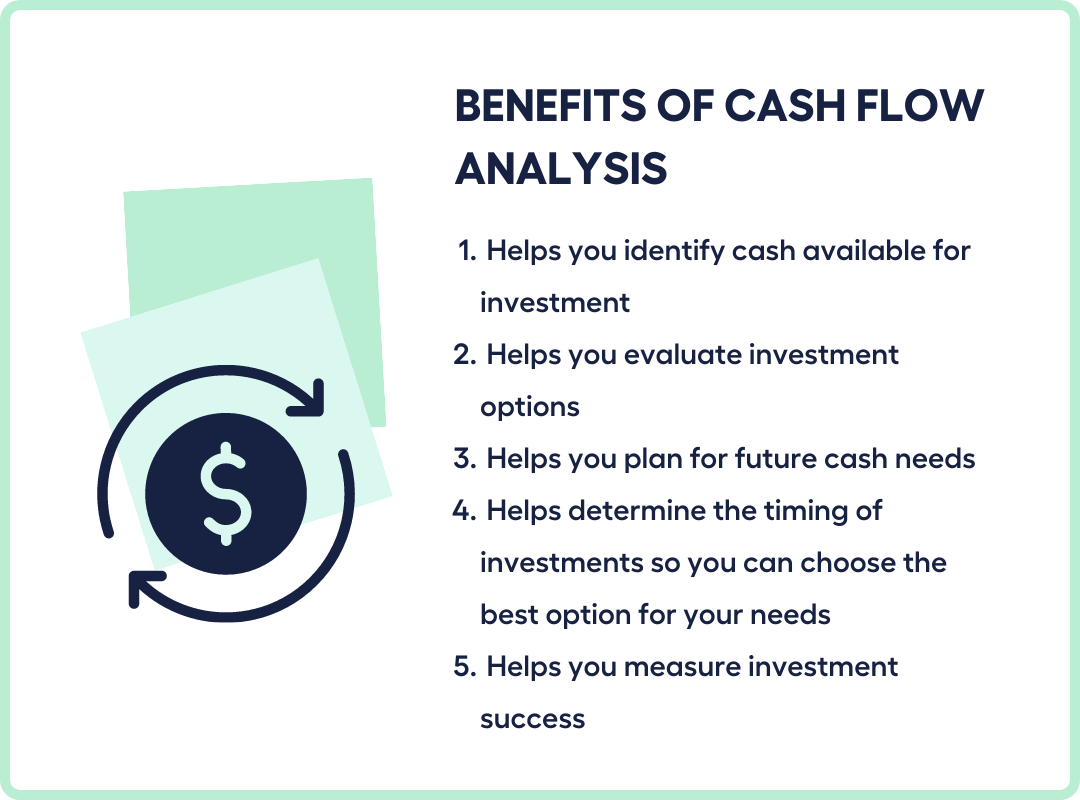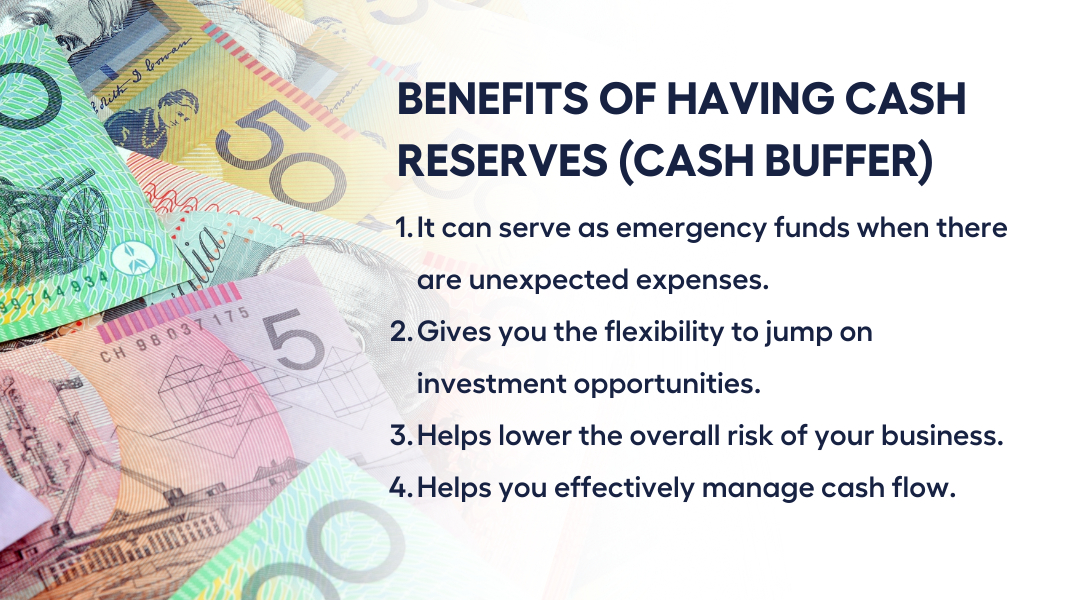“What to do with excess cash?” small business owners in Australia could be asking themselves as they are faced with this happy dilemma.

While having extra money on hand is a good problem to have, it’s important to make sure you’re using it wisely. In this article, we’ll explore some smart options for putting your excess cash to work so you can continue to grow your business, make it thrive, and secure its financial future.
Let’s get started!
Jump straight to…
Managing Cash Flow Growth in Your Small Business Can Be Tricky
Balancing the money coming in and going out of your small business can be a real juggling act.
As your business grows, you’ll need to invest in things like
- inventory,
- equipment,
- and staff to keep up with the increased demand.
However, these investments come at a cost, and if you’re not careful, your cash flow can take a hit.
But that’s not all. When you do have extra cash, it’s tempting to pour it all back into your business. But be warned, this can be a risky move.
- You need to make sure you’re keeping enough cash on hand to handle unexpected business expenses or slow periods.
And let’s not forget about the late-paying customers. They can really have a damaging effect on your cash flow and make it difficult to pay off debts or make necessary investments.
That’s why managing cash flow growth requires some serious planning and monitoring. You need to have a solid understanding of your business finances and make smart decisions about where to allocate your resources. By doing so, you’ll set yourself up for long-term success and ensure that your business can weather any storm that comes its way.
Tips for Investing Excess Money
Cash is king, but too much of it can also be a cause of concern. As a business owner, it’s important to strike the right balance when it comes to cash on hand.
- You want to have enough to cover emergencies and slow periods, but you also don’t want to have so much that you get complacent and lazy.
If your business is growing rapidly, you’ll need more cash to keep up. However, if you’re just sitting on a pile of cash without any plans to use it, it might be time to consider putting it to good use.
Having too much cash can lead to “lazy” practices, like not chasing down late payments or maintaining appropriate stock levels. This can cause problems down the line and hurt your business finances. So, it’s important to find the right balance for your business and industry.
This way, you can make sure you have enough cash on hand to cover your needs without letting it sit idle.
- Remember, having cash on hand is important, but having the right amount is crucial to the success of your business.
Now that we’ve discussed the importance of striking the right balance when it comes to excess money in your business, let’s dive into some practical tips on how to make the most of your surplus cash when used for investment.

Cash Flow Analysis
Cash flow analysis is your go-to tool if you’re looking to invest excess money from your business. This tool helps you understand the amount of cash your business generates and spends over a specific period. By analysing your cash flow, you can identify the cash available to invest in new opportunities.
Let’s dive deeper into the benefits of cash flow analysis:
1. Identify cash availability
It helps you identify the cash available for investment by evaluating the beginning cash, cash generated, and cash spent during a specific period. This enables you to make informed decisions on how much cash you can invest.
2. Evaluate investment options
Cash flow analysis helps you evaluate different investment options because by analysing the expected cash inflows and outflows, you can weigh the potential risks and returns of each investment opportunity.
3. Plan for cash needs
Cash flow analysis helps you plan for future cash needs. By analysing your cash flow, you can predict when you may require additional cash to fund new opportunities, pay off debts, or cover unexpected expenses.
4. Determine the timing of investments
By evaluating the timing of cash inflows and outflows associated with different investment options, you can choose the option that best fits your cash flow needs.
5. Measure investment success
By comparing actual cash inflows and outflows with your initial projections, you can determine if the investment was successful or not.

Establish Cash Reserves (Cash Buffer)
Instead of blowing your extra cash on hand on a big bonus or some extravagant expense, consider establishing a cash reserve or cash buffer for your business.
Here are the benefits of having cash reserves or cash buffer:
1. Emergency Funds
Having emergency funds at the ready can be a lifesaver. You never know when unexpected expenses might crop up, like a broken piece of equipment or a sudden drop in revenue. With cash reserves in place, you can weather a crisis without having to resort to taking on debt or cutting back on operations.
2. Investment Opportunities
Having a cash buffer gives you the flexibility to jump on investment opportunities as they arise. Imagine stumbling upon a great deal on new equipment or property. With cash reserves, you can jump on the opportunity without having to borrow or use other funds earmarked for operating expenses.
3. Lower Risk
Keeping excess cash on hand as a buffer can help lower the overall risk of your business. By having a cushion of cash available, you can avoid taking on too much debt or relying too heavily on credit lines. This can improve your business’s creditworthiness and reduce the risk of default.
4. Cash Flow Management
Having a cash buffer can help you manage cash flow more effectively. With extra cash on hand, you can cover expenses and meet financial obligations as they come due, avoiding cash flow gaps that can cause disruptions to operations or lead to missed opportunities.
Setting up a cash reserve or buffer could be a smart move for small businesses in Australia. It can provide emergency funds, investment opportunities, lower risk, and better cash flow management, all of which can help your business thrive and grow in the long run.

Pay Down Debts
Paying down debts is another way of investing excess cash in a small business in Australia because it can bring several benefits that can help the business grow and improve its financial health.
Let’s check out these benefits:
1. Reduced Interest Expenses
Paying off debts can reduce the amount of interest your business has to pay over time. Imagine saving money that would have gone towards interest payments and redirecting those funds towards other business needs. Sounds great, right?
2. Improved Creditworthiness
Paying down debts can improve your business’s creditworthiness. By paying debts on time and reducing your overall debt load, you can improve your credit score and make it easier to obtain credit in the future if needed. You may be able to obtain loans and credit lines with better terms as a result, making it simpler to access funds when required.
3. Increased Cash Flow
Paying off debts can increase your business’s cash flow. When you have less debt, you have fewer monthly payments to make, which frees up cash flow for other purposes. You can use this increased cash flow to invest in the business, purchase new equipment, or hire additional employees, all of which can help the business grow and become more profitable.
4. Reduce Overall Business Risk
When you have a high debt load, your business becomes more vulnerable to economic downturns or unexpected events. By paying off debts, you can reduce your risk exposure and become more resilient to market fluctuations.
If you want to improve your business’s financial health and grow in the long run, consider paying down debts as a smart way of investing excess cash in your small business in Australia.
Invest in Diversifying Your Income Strategy
If you’re a small business owner with extra cash lying around, investing it all in one venture can be risky business. One way to mitigate risk is by diversifying your income strategy.
Diversifying your income strategy means investing your excess cash in different income-generating assets or ventures.
By spreading your investment across various income-generating assets or ventures, you reduce your dependence on a single source of income and lower your risk of losing everything in one go. Plus, if one asset or venture isn’t performing well, you can still rely on other sources of income to maintain your financial stability.
There are various options for small business owners in Australia looking to diversify their income strategy.
You could invest in:
- shares,
- bonds,
- managed funds,
- or other financial instruments.
Alternatively, you could invest in real estate or other physical assets such as gold, art, or collectibles.
Another option is investing in another existing business either by buying shares or providing a loan. Not only do you get an additional source of income, but you’ll also be supporting the growth of another small business.
Maximise Capital Expenditures – Invest Back Into Your Business
If you’re running a small business, you know how tough the competition can be in Australia. To stay ahead of the game, one option you might consider is using any extra funds you have for capital expenditures, or “CapEx” for short.
Now, you might be thinking:
Capital expenditures? That sounds like a fancy finance term that doesn’t apply to me.
CapEx simply refers to investments your business makes in assets that will benefit you in the long run.
Think things like
- equipment,
- property,
- or technology upgrades.
Why invest in CapEx, you ask?
Well, because it can help you make even more money down the line, if the right purchases are made.
By upgrading your equipment or technology, for example, you might be able to increase your efficiency and productivity, which could translate to more sales and profits; and in the competitive landscape of small business, every little bit helps.
Spend Money on Items or Charities for Tax Deductions
Did you know that if you’re a small business owner in Australia, you can possibly reduce your tax bill by spending money on certain things?
You can buy things like business equipment, supplies, or travel expenses, and then claim them as a tax deduction. This means you’ll have to pay less tax, and you can use that money for other things in your business, like marketing or updating office furnishings.
And it’s not just spending money on your business that can help you save on taxes. You can also donate money to a charity and claim it as a tax deduction. This is beneficial not only for your business, but it also helps the community and can give your business a good reputation.
But here’s the thing – you shouldn’t just spend money for the sake of getting a tax deduction. You need to think carefully about whether it’s worth it and whether you really need the things you’re buying. It’s all about making smart decisions that will help your business grow and succeed in the long run.
Business booming and need help managing surplus cash? Book a FREE 15 min Call or Send Us Your Questions!

I want to see all my options with the help of a Finance Expert
Call Our Team TodaySOURCES:
mgiaust.com/financial-performance/cash-can-business-much/
smallbusiness.wa.gov.au/blog/managing-your-cash-flow
moneysmart.gov.au/financial-advice/choosing-a-financial-adviser





